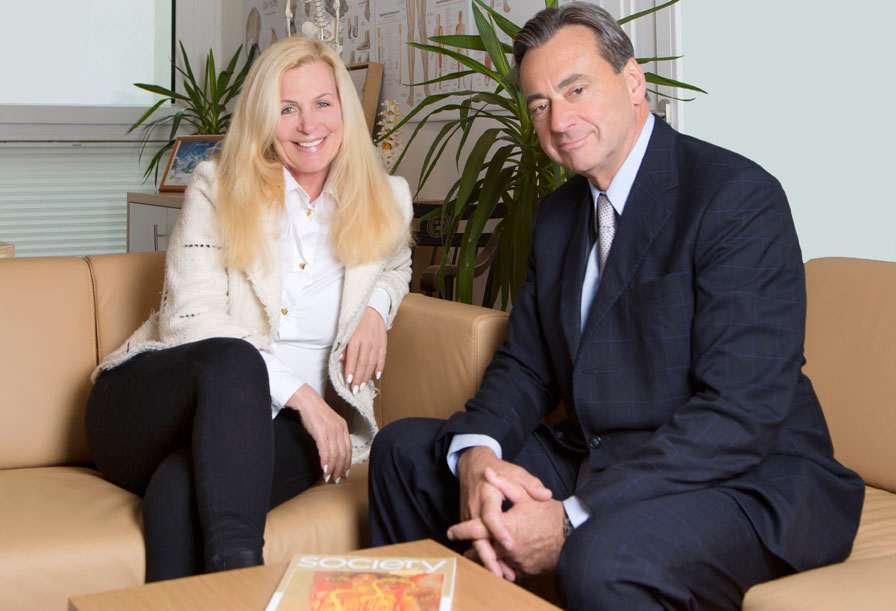SOCIETY publisher Gertrud Tauchhammer spoke to Professor Michael Zimpfer, MD, MBA, founder and owner of the newly established “Zentrum für Medizin und Gesundheit” (Vienna Medical Center) about the special health care needs of diplomats.
All of us are human beings, are there any specifics with regards to medical care for diplomats and their staff?
Modern medicine is supposed to prevent disease, this includes repeated check-ups or, if unattainable, to detect problems before they clinically occur, i.e., being apparent to patient and/or physician, or, albeit less favorably, to become alert at an early stage, in order to provide immediate and effective treatment.
Diplomatic representations, UN, IAEA as well as UNIDO have headquarters in Vienna, creating a group of professionals with attendance needs. Vienna also hosts a variety of conferences, sometimes assembling hundreds of diplomats and attendants at once, increasing the likelihood that an acute medical intervention may be necessary.The need for medical attention and awareness of supporting treatments is something that most embassies and diplomatic groups are well aware of but there is often still a need to know what is available and how to access it. The classic issues for those in post are being far from home and often with family members remaining at home who would otherwise provide support. Representatives are often less inclined to undergo preventive medical tests or delay taking action.
If, with a background of an acute condition, an immediate treatment becomes necessary, it is not always easy to get access to the medical history and records. Often, previous tests results are not provided by the patient and with no straightforward access to the physician who may earlier have been dealing with a patient at risk and holding preventive test or medical therapy results, this can result in delay and increase the risk to the patient.
Where medical imaging has been used, such as computerized tomography or nuclear magnetic resonance, the data is high volume meaning that even access via the internet is usually not feasible or satisfactory.
In a busy role, with a busy schedule, it is often easy to overlook the need for medical prevention to be included in an overall professional plan, with time constraints always an issue.
Costs can also be of concern, especially where hospitals are hesitant to provide quotes for a treatment or course of treatments, or a reliable estimate in a straightforward way. There is also the difficulty in making the decision on patient comfort vs. the availability of high end medical technology that can result in a tradeoff between big, government-supported hospitals vs. private „boutique“-healthcare.
How, in addressing these issues, is the newly established „Vienna Medical Center – Zentrum für Medizin und Gesundheit“ positioned?
The center is located within a central Viennese location and in the immediate vicinity of the Vienna General Hospital (Allgemeines Krankenhaus also referred to as the AKH), University Hospital, St. Anna Children’s Hospital (St. Anna Kinderspital) and various private hospitals, such as the Private Clinic Vienna (Wiener Privatklinik), Private Clinic Josefstadt (Confraternität – Privatklinik Josefstadt) and the Goldenes Kreuz Private Clinic (Krankenanstalt Goldenes Kreuz).
The „Vienna Medical Center“ is equipped with the most modern technology and provides a basis for consultants from various medical backgrounds being available for examining patients and providing treatments. It can also provide full medical check-ups as well as conservative and minimal-invasive pain medicine and treatments for patients with spine and joint discomfort.
The center maintains a close co-operation with various high-end medical institutions both internationally and throughout Austria in order to utilise qualified second opinion referrals, medical treatment abroad according to a patient’s wishes, or, in the rare case, that a highly-specialised treatment may not be available in country. Sometimes, legal issues arise with regards to medical coverage from abroad and in this case Setfords Solicitors, London, serves as one of our partners.
Michael Zimpfer, MD, is full professor at the Vienna General Hospital, Medical University of Vienna, and holds a master of business administration (MBA), University of Chicago. Previous assignments include Harvard Medical School (Cardiology Department, Peter Bent Brigham Hospital, Boston), Duke Medical Center for Outcomes Research, North Carolina. He is also a member of the Society of Friends of the Weizmann Institute of Science and served as a visiting professor at the King Faisal Specialist Hospital in Riyadh, Saudi Arabia.
Vienna Medical Center provides straightforward access to state-of-the-art diagnostics and leading-edge medicine for all disciplines including modern, conservative and minimal-invasive pain treatment.
For further information and professional certification details relating to post-doctoral medical and non-medical training:
3/101 Pelikangasse
1090 Vienna/Austria
Phone: +43 – 1 – 997 28 30,
Fax: +43 – 1 – 997 28 30 – 99
E-mail: michael@zimpfer.at
www.zimpfer.at
Fotos: Sandra Herczeg, Isabella Abel

